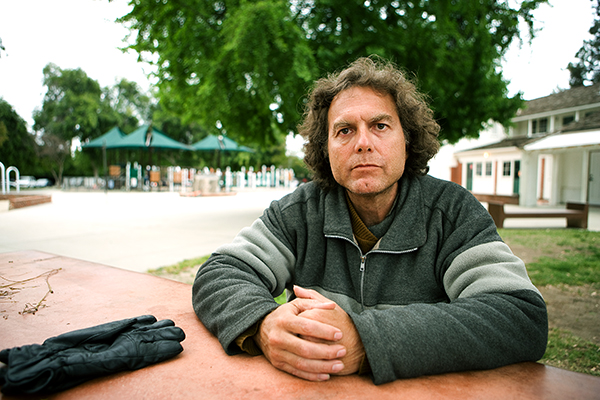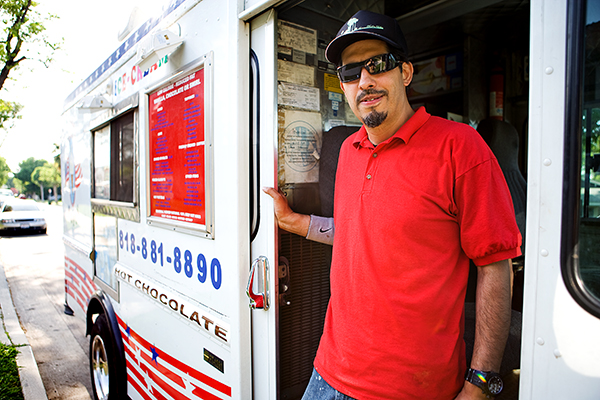
Late last night I receive a phone message, recorded at 10:47: “Yeah… I believe I’ve got the right number… this is Cowboy Bob… a friend of your 365… and you can call me back at this number, 000-000-0000… and I should be somewhere up near Platt all morning… I’d like to meet up with him maybe like 1 or 2 or 3… somewhere in that area… just have him call me sometime about noon or so… OK”
I know exactly who it is at first voice. Back to Pappy, our friend of day 234, at the close of our time together, he introduced me to the Cowboy. As I do with everyone I meet, I extended a hand of friendship by offering a 365 business card with an accompanied invitation to be interviewed. Bob is the first to accept the offer.
We catch up at an agreed upon location – a nearby park that is slowly becoming a base meeting place for several of our 365 meetings. So at an agreed 3pm, Bob and I sit for the beginning of a two-hour interview of which, in respect to keeping the word count manageable, I am only able to give you a thumbnail overview.
 “I dressed up for you,” Bob interjects, extending his arms to showcase the leather work of his jacket, as we begin our dialogue. It’s a hot afternoon and the fact that he wears long sleeve leather is an indicator of the pride he has taken in being at his best in conversing with us.
“I dressed up for you,” Bob interjects, extending his arms to showcase the leather work of his jacket, as we begin our dialogue. It’s a hot afternoon and the fact that he wears long sleeve leather is an indicator of the pride he has taken in being at his best in conversing with us.
Bob is nearly deaf so I ask minimal questions, leaning back to take note of his endless commentary.
Bob has seen a lot in his life, and just like Pappy, he is a protector of the streets. “Lots of people on the street call me Dad,” he proceeds in sharing his life story.
“They look at me like a dad – they adopted me.” The Cowboy stances as he tells me of one of his street adoptee’s: “One day I’ll introduce you to Joey, he is thirty-eight and just got a job. He got it at Kaiser. He needed medical help. Then they got him set up in assisted housing, and now they are giving him a computer job. Joey is a good kid and has a great story.”

The Cowboy goes on, telling me of others in his extended street family and of a range of situations. Things like, police abuse, gang influences and the difficulties for homeless women.
What impresses me is how connected Bob is. During our interview he accepts several phone calls from a few of his friends. One stands out, his current girlfriend, who in Bob’s words: “She is a sweet girl. I love her.”
After six years on the street, Bob and she are finding a roof over their heads at a local group housing facility; a facility that he thanks for the aid that they give to not only himself, but to the others whom he finds himself now cohabitating with.
 Bob speaks of his history, “I was born in Saint Louis, Missouri. My dad was gone early in my life. I think he went to Indiana. My mom became bedridden with varicose veins. That is when a Los Angeles couple, through the system, adopted me. I was about ten.”
Bob speaks of his history, “I was born in Saint Louis, Missouri. My dad was gone early in my life. I think he went to Indiana. My mom became bedridden with varicose veins. That is when a Los Angeles couple, through the system, adopted me. I was about ten.”
They wanted to change my name, but that ended up not happening. My mom named me after the Robert E. Lee riverboat. I remember standing on the river and crossing a bridge that is long gone. They tore it down to build the arches. That is why I love the riverboat at Disneyland; it brings back good memories. My mom was a beautiful woman; I’ll never forget her red hair.”
“Were your adoptive parents good parents?” I question.
“Not at all!” Bob reacts, “They claimed they were Christians, but they weren’t. They beat us, locked us in rooms. At the time we were too scared to tell anyone.”
In saying, “Us,” Cowboy Bob refers to his two brothers. “I stay in touch with my brother William, he is a good guy. My other brother is demented and I don’t know where he is.”
They say the sins of the parents fall on the children, and in hearing of Bob adoptive parents, my stomach turns to even think of the pains that the Cowboy has endured in his childhood. But there is a silver lining to the story, “They tried to break me, but I never lost faith, and I have to give credit to the grandmother from my adopted mother; she was good, and also my real mother’s mom, they taught me the real God, and to stay away from drugs and alcohol.”
 “Later in life I found my drug, riding bulls and motorcycles,” Cowboy Bob admits as he makes a joke, “It was safer than dealing with California drivers.”
“Later in life I found my drug, riding bulls and motorcycles,” Cowboy Bob admits as he makes a joke, “It was safer than dealing with California drivers.”
Our conversation continues, jumping from subject to subject:
“I played harmonica with many bands in various country clubs.”
“I was a bodyguard for wrestlers (I was a tiny guy, that is what scared people)”
“All single moms should learn martial arts.”
“I was married twice, loved my wives, but they passed away.”
Married twice? The doors to a deeper inquiry swing wide open. And with that exposed and the day getting late, I offer Bob a ride to his shelter. As we walk to the car we begin our dialogue regarding his later life history. We start from the present and work backwards.

“My Wife died 6 years ago,” Bob opens up. “That is when my homelessness started. We had an apartment and I was told that legally I had six months to vacate. But the police came, and with all the neighbors fighting for me, they hand cuffed me; then forced me out of my apartment. They took off the handcuffs and at gunpoint forced me across the street. All of my possessions, even my briefcase with my paperwork was left behind. I’ve been homeless since.
Later I got a motor home, same stuff happened. It was impounded for expired tags, even though they were current. DMV said I was legal and needed to go to the Spring Street court to work it out. I called the impound; they told me my motor home would not be sold. I went to court the next day, then to the impound. When I got there they told me they sold my home the day before for $75. Everything I had was in it.
I was trying to get back to Arizona, where I lived with my first wife. It is a better place for the homeless. But after I lost my motor home I had no way of getting there.
The police in Reseda and Van Nuys are very tough on the homeless. I’m just trying to survive.”
“I remember living in Arizona and Utah with my first wife.” He tells me of his homes and of his Palomino horses, “Oh they were beautiful playing in the snow, we used to just sit back a watch them in the winter. Those were great days.”
Bob tells us of his children, two of which he is still in contact with.
“We home schooled and my kids made it. At sixteen, my youngest daughter had twelve teaching units. Now at 41 she is married with two daughters and works as a pastry maker.
“My eldest daughter was working in veterinary clinics at seventeen, now she is a pharmacist.
“I lost track of my other daughter.”

In two hours there is no way I can really know Bob’s true history, but in all that he says it is not to me to judge or to make assessments. So the contrast in knowing the whereabouts of only three of his children, to that of loosing one is subject to no conditions.
I myself had several years in which I estranged myself from my parents. And that was in the best of circumstances. So there can be no blame placed without fully knowing the story. So all I can say is, request a hopeful perspective from all of us that Bobs missing daughter is OK.
Bob councils us, “Stick to the Bible… God’s word, and keep up the faith. Try not to get mixed up with all the different beliefs. Lean on God’s words. All these rumors of the world ending are wrong… it is only going to be the beginning.
“Prayers and keeping the faith is very important. God will give the strength and the power.
“You have to understand other people’s beliefs, so you can get alone or know how to protect yourself. And find people you can trust to council with.
“It will get worse before it gets better.”
The topic turns dark for a final push of advice, “I see people tattooing their children, that is what drugs and the devil does.
“People need to think of the children and their children’s future. And to do that… the people need to straighten up.
“My kids made it!” Cowboy Bob bears.
A point that drives deep into my heart. Like I noted earlier, “There is no way I can really know Bob’s true history.”
I’m absolutely certain that Bob has had a difficult life; a life that I can only assume would have easily crumbled many. I have a belief that none of us are given any hardship that we cannot bear. And, after speaking with so many people of the streets, I am coming to an awareness of the strength of character it takes to merely survive without a roof overhead.

To find a man who speaks responsibly of parenthood, of marriage and of faith. And a man who is continually striving to better his situation is a man to be respected.
Cowboy Bob, hats off to you, keep riding my friend.

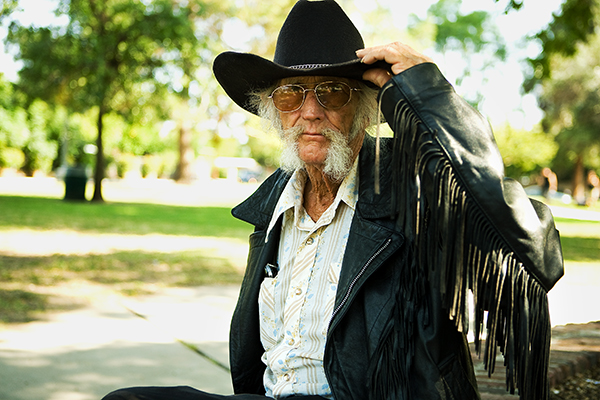
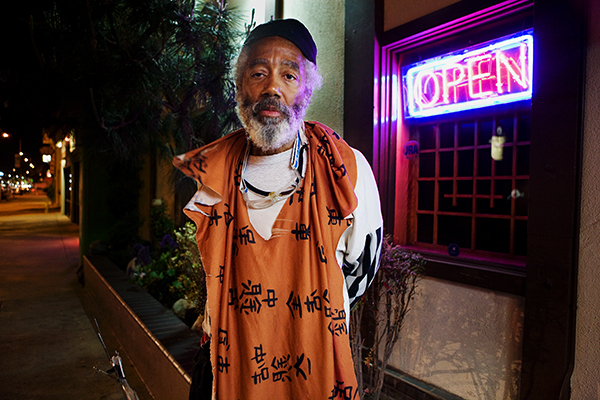

 It’s 9pm and the sidewalk is just starting to get busy with weekend traffic. Center to its building-up energy is Lou – quite, respectful and full of music to share with all who take time to stop to listen and talk with him.
It’s 9pm and the sidewalk is just starting to get busy with weekend traffic. Center to its building-up energy is Lou – quite, respectful and full of music to share with all who take time to stop to listen and talk with him.


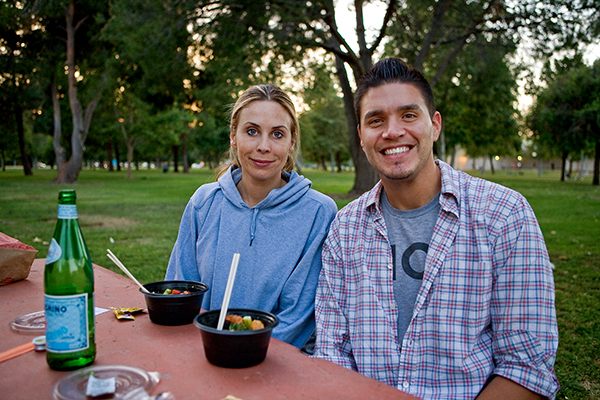
 I approach with my usual zeal, and wonderfully enough, I am cordially accepted into the lives of Bernadette, Joey and their dog Beckham.
I approach with my usual zeal, and wonderfully enough, I am cordially accepted into the lives of Bernadette, Joey and their dog Beckham.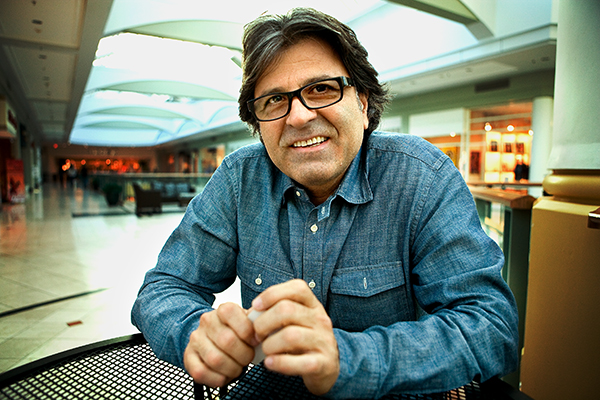





 It’s our weekly park day, a day, where throughout the school year, fifty or more families gather in coming together in unity and education; a group of much diversity and life histories, yet today a group that has joined in one objective, to raise money to build wells in Sudan.
It’s our weekly park day, a day, where throughout the school year, fifty or more families gather in coming together in unity and education; a group of much diversity and life histories, yet today a group that has joined in one objective, to raise money to build wells in Sudan. They have titled the day, “Walk for Water,” in doing their best to emulate the conditions that the children in Sudan suffer as they walk over two hours, up to twice a day, carrying water to their villages. Water that at many times is unclean and diseased.
They have titled the day, “Walk for Water,” in doing their best to emulate the conditions that the children in Sudan suffer as they walk over two hours, up to twice a day, carrying water to their villages. Water that at many times is unclean and diseased. All facts that many of today’s walkathon kids know, and facts that are the result of following the first inspiration to organize this fund-raising event, the works of Salva Dut, a man featured in
All facts that many of today’s walkathon kids know, and facts that are the result of following the first inspiration to organize this fund-raising event, the works of Salva Dut, a man featured in  A foundation that, as the brainchild of Dut, has one major goal: To save lives, build communities and to give rest and health to the many families and children of Sudan. Families and children who on a regular basis must trek a path that is not optional; but, fundamentally required for their literal existence.
A foundation that, as the brainchild of Dut, has one major goal: To save lives, build communities and to give rest and health to the many families and children of Sudan. Families and children who on a regular basis must trek a path that is not optional; but, fundamentally required for their literal existence.

